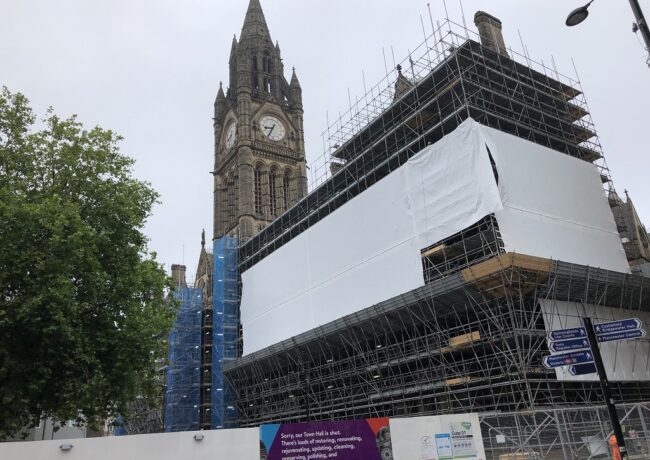Manchester reviews progress on climate change
The city council said its quest to halve its direct carbon emissions by 2025 is on track almost a year after it adopted an “ambitious” action plan, but the strategy faced challenges due to Covid-19.
The Climate Change Action Plan 2020-25, adopted last March, set out measures Manchester City Council would take to halve the carbon emissions from its buildings, energy use and transport from around 30,000 tonnes a year in 2019/20 to 15,000 tonnes a year in 2024/25.
The targets were based on a 13% year-on-year reduction trajectory. Figures at the time showed that the council’s direct CO2 emissions had fallen by 54.7% between 2009/10 and 2019/20.
The latest figures, to be examined by the council’s environment scrutiny committee next week show that total carbon emissions in the year 2020/21 stand around 25% lower than for the previous year, meaning targets have been achieved.
The report highlighted the council’s main achievements that contributed to the reduction and said that “much has been achieved against a difficult backdrop”.
The city council in 2020:
- replaced 56,000 streetlights with low-emission LED alternatives
- invested in 27 electric bin lorries to replace more than half of the refuse collection fleet and save 900 tonnes of carbon emissions a year
- installed electric vehicle charging points at the three biggest council depots to support wider electrification of council vehicles
- neared completion of the Civic Quarter Heat Network, a shared heating system to reduce emissions and costs across prominent city centre buildings including the Town Hall extension, Central Library and Manchester Central Convention Centre, to eventually save 1,600 tonnes of emissions a year
- started work on the 6.5-acre Mayfield Park, the first city centre park for years
- completed West Gorton’s ‘sponge park’ as a pilot for how nature-based solutions can help to combat the effects of climate change
- launched a programme to retrofit council buildings to cut emissions and energy costs. The strategy aims to retrofit 350 council buildings and so far eight leisure centres including Wythenshawe Forum have been retrofitted
- secured a further £5.5m in funding for ‘active travel’ schemes to promote walking and cycling, and better links with public transport across the city. The council also opened the UK’s first ‘Cyclops’ junction for cylists and walkers
- piloted new procurement rules that give added weight to environmental considerations when the council buys in goods and service from external suppliers, asking them to demonstrate how they will support the city’s zero-carbon ambitions.
Others measures taken include launching the £1m Tree action programme to plant thousands of trees across Manchester over the next two years, delivering carbon literacy training to 1,000 council staff, and working with communities in the city’s 32 wards to embed climate change action in ward plans.
In addition, the council is working to ensure the city’s climate change ambitions are embedded in other strategies such as Manchester’s post-Covid economic recovery plan unveiled last year. The plan allocates £289m to schemes such as a proposal to retrofit 10,500 social housing units over four years to cut emissions and energy costs.
Emerging priorities for the 2021/22 include continuing to bid for external funding to help deliver environmental projects, while continuing to move forward with existing initiatives, the council’s report said.
There is also an opportunity to reduce staff travel through the use of IT and new ways of working, capturing changes instigated during the pandemic.
Cllr Angeliki Stogia, executive member for environment at Manchester City Council, said: “There has been strong and measurable progress since our Climate Change Action Plan was adopted last year.
“While the pandemic has understandably dominated headlines, we haven’t lost sight of the urgent existential threat posed by the climate crisis and the steps we can all take to limit its impacts.
“For our part, we know there is still much more to do. But we have taken real and ambitious actions and are focused on maintaining and accelerating momentum.
“The benefits of success will not simply be the city’s contribution to combatting climate change, as important as that is. They will include more pleasant and healthier places, cheaper fuel bills and jobs in the green economy – a win-win for Manchester people.”




